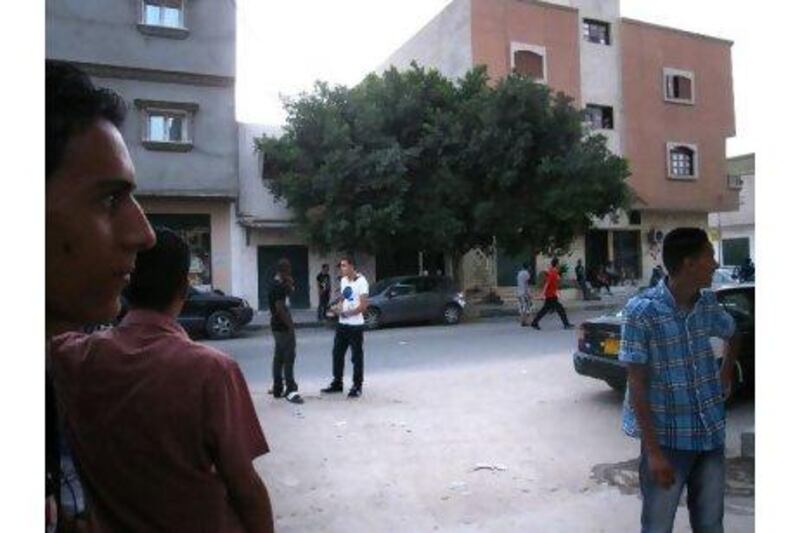TRIPOLI // Residents of Tripoli's Abu Slim district agree that Youssef and Abdelkarim El Hazali were shot down under a tree in Misurati Street by anti-Qaddafi forces. Beyond that, there is little agreement about how they should be remembered.
Admirers describe the brothers as charismatic gunmen who heroically stood up to defend this pro-Qaddafi neighbourhood as the regime crumbled. Others say they were criminals who thrived in a violent underworld of trafficked drugs and alcohol.
Whatever the case, men such as the El Hazali brothers played key roles in the regime's efforts to survive as the protests that began in February turned within weeks into outright civil war. With the authority of Colonel Muammar Qaddafi, his family and his followers ebbing by the day, it was to the disreputable - if not the criminal - that his regime increasingly turned to stem the rising tide.
Youssef and Abdelkarim El Hazali seemed destined to meet a violent end. The El Hazalis lived in a handsome three-storey house down a dirt alley in Abu Slim. "I've known them almost since I was a baby," said Azza, 34, a neighbour who stopped at Mohammed Gheriani's food shop across the street from the home. "The brothers used to walk their sisters to school, and they had all kinds of animals - dogs, birds, even gazelles."
While the El Hazali brothers prospered, however, Abu Slim remained rife with unemployment, drugs and guns.
Neighbours recall raucous parties at the El Hazali house - "music, dancing, whisky, hashish and girls", said Abdeslam, 30, a neighbour who sometimes joined in.
In recent years the eldest four of the nine El Hazali brothers died. After that, Youssef El Hazali took charge of the family, neighbours said. Tall and domineering, he was jailed in 2009 for drug trafficking, then released in February with other prisoners as protests evolved into civil war, said Abdelaziz Dughman, the head of Abu Slim's local council.
"They were criminals," Mr Dughman said. "But after the revolution started, they began working for the regime."
The Qaddafi family were old hands at mixing criminality with governance, said Ronald Bruce St John, the author of seven books about Libya.
Colonel Qaddafi's sons ran various sectors of the economy through bribery and coercion.
The El Hazali family appears to be no different. Official documents identifying Miloud El Hazali, a brother, as an internal security agent were found in his abandoned car with dozens of surveillance files, Mr Dughman said.
The National was shown a car that Mr Dughman said was Mr El Hazali's with general security committee file folders inside but not Mr El Hazali's ID documents.
Besides claims of drug-trafficking, there are also allegations of stockpiling weapons.
"The regime was bringing weapons to them, everything from pistols to explosives," Mr Dughman said. "We searched their house here, plus a second house."
The first arms delivery - Kalashnikovs - arrived in a white car, Mr Dughman and Mr Gheriani said.
The occupant of the vehicle was Oussama Hasnaoui, a security official related by marriage to Col Qaddafi, Mr Gheriani said. "I saw him bring weapons again and again but using different cars."
Mr Gheriani's claim could not be independently verified. The El Hazali brothers armed their neighbours in anticipation of the pending battle for Tripoli, Mr Dughman and neighbours said.
"I got a Kalashnikov," said Azza. "I still have it. I'm afraid. Everyone who supports Qaddafi is nervous."
Azza and other neighbours recalled the El Hazali brothers' grit - and sometimes gallantry - as fighting drew closer to the capital.
On the eve of his death, Abdelkarim El Hazali promised his neighbour, Hafsia Mohammed, 31, that "nobody will harm you while I am alive", she said.
"Abdelkarim was a nice guy," said Mr Gheriani. "Youssef was mean."
Jailed in 1996 for his part in stabbing a man to death, a drunken Youssef El Hazali once struck Mr Gheriani with a brick and framed him for hashish dealing, he said.
One night in April, Youssef narrowly missed hitting Abdelhakim Gneidi, 14, with his car.
"He seemed drunk," Abdelhakim said. "I told him to slow down and he got out and stabbed me here," he said, pointing to his left buttock, where a scar remains.
Abdelhakim hid in his cousin's house. Youssef stalked around outside, firing his Kalashnikov in the air until Abdelhakim's family persuaded him to leave, he said.
Meanwhile, Abdelkarim El Hazali grew increasingly tense, said Abdeslam.
Asked about rumours that he might surrender to the NTC, Abdelkarim threatened Abdeslam with his Kalashnikov and said his only options were "victory or death". In the end, it was death.
On August 26, NTC forces entered the neighbourhood. After an hour of fighting, Abdelkarim and Youssef made a last stand in Misurati Street.
The NTC fighters converged. The brothers stood back-to-back with belt-fed machine guns. Both surrendered their guns but resisted arrest, Mr Dughman said. Abdelkarim shoved an NTC fighter. Jittery NTC fighters then opened fire, he said.
But another story is also circulating in Abu Slim, as told by Abdeslam and Mrs Mohammed - the brothers raised their guns, cried "Allahu Akhbar" and died in a storm of bullets.
Youssef was struck behind the left ear and Abdelkarim in the chest, said Mr Dughman. No investigation of the incident is planned, he said.
NTC fighters removed the bodies. The family has vanished and could not be reached for comment.
"They were criminals. May God have mercy on them," said Abdelminam Gneidi, 28, a brother of Abdelhakim Gneidi. "Now they're finished and we'll have a constitution."
Azza mourns the violent men she called friends. "They were great guys," she said, wiping away a stray tear. "They died on Leilat Al Qadr."
"They were bad men," Mr Gheriani said. "But I never wanted them to die like that."





